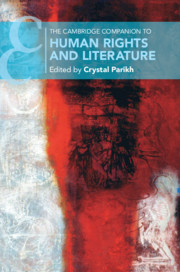Book contents
- The Cambridge Companion to Human Rights and Literature
- The Cambridge Companion to Human Rights and Literature
- Copyright page
- Epigraph
- Contents
- Notes on Contributors
- Chronology of Major Works and Events, 1215–2018
- Introduction
- Part I Genealogies and Contexts
- Part II Fashioning Methods
- Part III Generic Representations
- Part IV Writing Human Rights
- Select Bibliography
- Index
- Cambridge Companions To …
Part IV - Writing Human Rights
Published online by Cambridge University Press: 24 June 2019
- The Cambridge Companion to Human Rights and Literature
- The Cambridge Companion to Human Rights and Literature
- Copyright page
- Epigraph
- Contents
- Notes on Contributors
- Chronology of Major Works and Events, 1215–2018
- Introduction
- Part I Genealogies and Contexts
- Part II Fashioning Methods
- Part III Generic Representations
- Part IV Writing Human Rights
- Select Bibliography
- Index
- Cambridge Companions To …
Summary
Most legal and juridical proceedings depend upon fixed positions with regards to human rights claims, especially where violations of rights are concerned, those of victims, perpetrators, witnesses, and sometimes, although to a lesser extent, beneficiaries. However, the social and political realities in which rights are embedded usually prove much murkier. For example, those who carry out atrocities one minute, might find themselves the object of state violence the next; witnesses who receive reparations or are able to sell their stories might seem like less innocent beneficiaries of the events of which they’ve given accounts, and a much broader notion of culpability calls into question the function or efficaciousness of identifying individual perpetrators. This chapter argues that literature is especially well-suited for evincing and elaborating such ambiguities and contradictions that inhere in the history and politics of human rights.
Keywords
- Type
- Chapter
- Information
- The Cambridge Companion to Human Rights and Literature , pp. 191 - 232Publisher: Cambridge University PressPrint publication year: 2019

